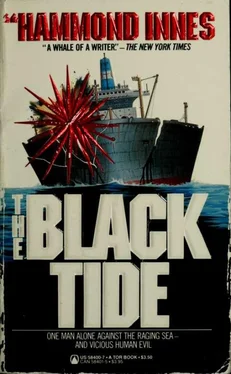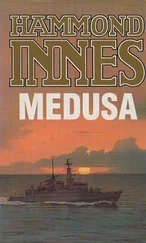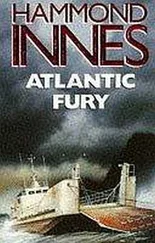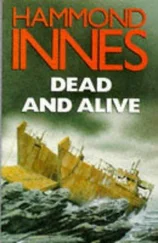Hammond Innes - The Black Tide
Здесь есть возможность читать онлайн «Hammond Innes - The Black Tide» весь текст электронной книги совершенно бесплатно (целиком полную версию без сокращений). В некоторых случаях можно слушать аудио, скачать через торрент в формате fb2 и присутствует краткое содержание. Жанр: Прочие приключения, на английском языке. Описание произведения, (предисловие) а так же отзывы посетителей доступны на портале библиотеки ЛибКат.
- Название:The Black Tide
- Автор:
- Жанр:
- Год:неизвестен
- ISBN:нет данных
- Рейтинг книги:4 / 5. Голосов: 1
-
Избранное:Добавить в избранное
- Отзывы:
-
Ваша оценка:
- 80
- 1
- 2
- 3
- 4
- 5
The Black Tide: краткое содержание, описание и аннотация
Предлагаем к чтению аннотацию, описание, краткое содержание или предисловие (зависит от того, что написал сам автор книги «The Black Tide»). Если вы не нашли необходимую информацию о книге — напишите в комментариях, мы постараемся отыскать её.
The Black Tide — читать онлайн бесплатно полную книгу (весь текст) целиком
Ниже представлен текст книги, разбитый по страницам. Система сохранения места последней прочитанной страницы, позволяет с удобством читать онлайн бесплатно книгу «The Black Tide», без необходимости каждый раз заново искать на чём Вы остановились. Поставьте закладку, и сможете в любой момент перейти на страницу, на которой закончили чтение.
Интервал:
Закладка:
He was leaning right over me, his voice insistent, and I felt like throwing the file at him. Couldn’t he understand what I was feeling, reading through those cuttings? And his voice going on again, cold, incisive: ‘It could be worth quite a lot to you. I’m sure my clients would not be ungrateful. There’s usually a reward, something quite substantial, when an insurance claim is refuted. And the claim here is in the order of eleven million, so we’re not talking about—’
I looked up at him then, hating him for his stupidity. ‘What the hell are you talking about?’ My voice sounded high and uncontrolled. ‘Money! I’m not going after him for money.’
He had the grace then to say he was sorry, a muttered apology as he turned away and opened the door. I think he was suddenly a little scared of me. ‘I’ll leave the file — you might like to look through it…’ The clockwork eyes darted back and forth. ‘I’m sorry,’ he said again. ‘I didn’t quite realize…’ The door closed, and he was gone, leaving me alone with those macabre cuttings.
A lot of the newspaper reports I hadn’t seen before. They were spread over several days, and there were pictures. For factual details the Telegraph coverage seemed the best, and both the Telegraph and The Times had run long articles on the problems of pollution. And then I came upon this, from a weekly magazine: Was she a nut-case, or just a totally impractical young woman determined to set fire to the slick? Or was it done in full command of her senses, an act of great courage undertaken with one aim in mind — to shock the country into taking action to deal with the terrible and growing menace that successive governments have swept under the carpet? And there was a headline I thought Karen would have appreciated — GIRL’S TANKER PYRE SAVES SEABIRDS. The pictures, too — the whole front page of the Sun, a night shot with the mist lit by flames, a photograph of Karen inset on one side and one of myself on the other, a clip probably from the TV interview after I’d come back with Andy, my hair plastered over my face, my mouth open and shouting, my eyes wild.
I glanced at them all, pausing here and there to read. And then I had passed beyond that terrible Twelfth Night, back to cuttings that reported the effects of the stranding, the damage to the environment, the probable cost of pollution control, the proportion of the insurance claim to be borne by the London market, Lloyd’s in particular. There were pictures from two of the Sunday papers of the wreck and the salvage ships taken from the air. And then I was looking at a picture of the crew being landed at Sennen Cove. They looked Chinese, all except the officers whose names were given in the caption below. Aristides Speridion, Second Engineer. It was the first time I had seen a picture of the man. He had a lined, rather sad face, squarish with a dark moustache and dark hair, and a hooked nose so that he might have passed as a member of almost any of the
Mediterranean races. He was wearing a sweater under his uniform reefer and his ears stuck out prominently on either side of the peaked cap, which he wore pushed up on to the back of his head and at a jaunty angle as though he was pleased with himself and to hell with everybody else. The picture also revealed that, if this were the full complement, officers and crew numbered only fifteen.
I was sitting with my chin in my hands, my elbows on the desk, concentrating all my mind on absorbing and retaining the image of the man I now knew to be Choffel, and then suddenly my attention was caught by the face of a bystander right on the edge of the crowd to the left of the picture — a big man, half a head taller than any of the others, broad-shouldered, thick-set. He was in profile, but even so I could see the heavy set of the jaw, the big jowls and the round bullet head. The size of the man alone, the way he stood, the arms slack but the body balanced and alert — I didn’t need a caption to tell me who it was. Baldwick! And the date of that cutting was January 3, which meant he had come from Bristol immediately the news of the stranding broke. Why? That Sunday when he had come to Balkaer… he hadn’t said anything about having been in Sennen nine days before.
I leaned back, staring out of the window with its rime of snow, wondering why he had been there. Was it Choffel he had been after? At Balkaer all he had said was that he’d be in Falmouth that evening, to see the captain of the Petros Jupiter. No mention of the second engineer, no reference to the fact that he had
been there, in Sennen, when the whole crew were brought ashore. In any case, it wasn’t the captain who’d put the engines out of action. No, it had to be Choffel, and if I was right, then the one man who knew where the little bastard would be now was Baldwick. The card he had given me was in my pocket, but when I rang the Liverpool number he had scribbled on the back of it he had already left — for France, the hotel said, but they had no forwarding address.
His next destination was Nantes, a river port on the Loire, so probably Choffel had given him the names of possible ships’ officers he knew who needed money and were not too particular how they came by it. I phoned the Nantes number. It was the Hotel du Commerce. Yes, Monsieur Baldwick had a reservation, but he do not arrive yet. His room there was booked for two nights.
I leaned back again, staring out at the darkening sky, thinking about Len Baldwick and a story I had once heard of his early life in Sheffield, from a little rat-faced Sparks I’d met at an oil man’s flat in Basra. He’d been a shop floor convener in a privately owned steelworks then, a paid-up card-holding Communist, the man had said, and to his certain knowledge Baldwick had set fire to the home of a well-known Labour supporter who had accused him of intimidation. Was that what he’d done to Choffel, intimidated him? Had he fixed it all, the Vague d’Or, the Corsaire, the dhow in the Hormuz Straits? Was he the link by which I could catch up with the man?
My hand reached slowly out to the internal phone,
trembling slightly as I lifted the receiver and dialled the grey-haired woman’s extension. Phone me, she had said, if you want anything… and Saltley the night before trying to insist that I went out to Karachi for him. The woman answered. I took a deep breath and asked her to contact their usual travel agents and have them book me on the next flight to Nantes. She didn’t argue. She just took it in her stride as though a sudden request like that from a total stranger was the most natural thing in the world. All she said was, ‘Return or single, Mr Rodin?’
‘Single,’ I said. I thanked her and put down the receiver, and after that I just sat there, not caring what Saltley would say, only wondering what the hell I was letting myself in for.
It must have been about ten minutes later that the door was pushed open and he came bustling in, a briefcase in one hand, a file of papers in the other, his face still pink with the cold outside and his overcoat glistening with melted snow. A bright red woollen cap was perched incongruously on his head. ‘So you’re going to Nantes.’ He dumped his papers and briefcase on the desk. ‘Mrs Shipton asked me to tell you they’ve booked you on tomorrow’s flight.’ He glanced at his watch, then passed me my anorak from the chair where I had thrown it. ‘We’ll be late, I’m afraid. I said one o’clock and it’s that already.’ He hurried me out, along a corridor that led to another set of lifts, explaining as we went that after I had left his club the previous night Michael Stewart had suggested we had lunch with him in the Captain’s Room at Lloyd’s.
‘That’s if you were going to work for us. I take it you are?’
‘So long as I have a free hand,’ I said.
Читать дальшеИнтервал:
Закладка:
Похожие книги на «The Black Tide»
Представляем Вашему вниманию похожие книги на «The Black Tide» списком для выбора. Мы отобрали схожую по названию и смыслу литературу в надежде предоставить читателям больше вариантов отыскать новые, интересные, ещё непрочитанные произведения.
Обсуждение, отзывы о книге «The Black Tide» и просто собственные мнения читателей. Оставьте ваши комментарии, напишите, что Вы думаете о произведении, его смысле или главных героях. Укажите что конкретно понравилось, а что нет, и почему Вы так считаете.












